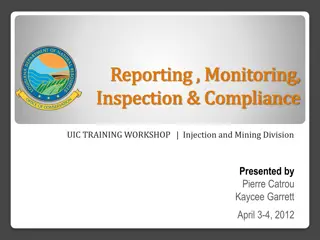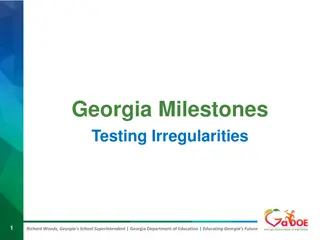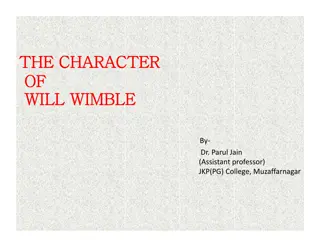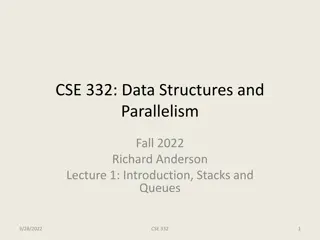
Reform of AS and A Level Qualifications: Overview and Responsibilities
Gain insights into the reform of AS and A Level qualifications including timelines, changes, and responsibilities for qualifications reform in the UK education system. Understand the purpose and principles guiding the availability of subjects to align with academic standards.
Download Presentation

Please find below an Image/Link to download the presentation.
The content on the website is provided AS IS for your information and personal use only. It may not be sold, licensed, or shared on other websites without obtaining consent from the author. If you encounter any issues during the download, it is possible that the publisher has removed the file from their server.
You are allowed to download the files provided on this website for personal or commercial use, subject to the condition that they are used lawfully. All files are the property of their respective owners.
The content on the website is provided AS IS for your information and personal use only. It may not be sold, licensed, or shared on other websites without obtaining consent from the author.
E N D
Presentation Transcript
AS and A level Reform HE Admissions Seminar 8 March 2016
Overview of session AS and A Level reform Brief overview of context Timeline for reform Summary of main changes to AS and A Levels Awarding new AS and A levels in 2016 and 2017 Changes in other parts of the UK
Responsibilities for qualifications reform Ministerial responsibilities: Overall policy on qualifications purposes, priorities How the curriculum is developed and subject content for qualifications Link to wider policy agenda Ofqual s responsibilities: Standards of qualifications Efficiency and value for money of qualifications Regulatory oversight of the qualifications system Exam Boards: Design and Deliver qualifications
Purpose of A Level and AS qualifications A level qualifications must: define and assess achievement of the knowledge, skills and understanding needed by students planning to progress to undergraduate study at a UK higher education establishment, particularly (although not only) in the same subject area; set out a robust and internationally comparable post-16 academic course of study to develop that knowledge, skills and understanding; permit UK universities to accurately identify the level of attainment of students; provide a basis for school and college accountability measures at age 18; provide a benchmark of academic ability for employers. AS qualifications must: provide evidence of students achievements in a robust and internationally comparable post-16 course of study that is a subset of A level content; enable students to broaden the range of subjects they study, and support progression to further study or employment.
Principles for Subject Availability The five principles we use to make judgements about whether we expect to be able to regulate a subject effectively are: Purpose must align to the stated purpose of the qualification Level of demand as far as possible, of the same level of academic demand as other subjects Differentiation of student performance gradable A* to E or 9 to 1 Other aspects of validity reliability and manageability key. Separation of subjects a distinct subject with sufficient breadth and depth of unique content, and sufficiently distinct stakeholder expectations
Timeline September2015 September 2016 September 2017 First teaching of 1st tranche of new GCSEs and A levels 2nd tranche of new GCSEs and A levels start to be taught Remaining subjects at all levels start to be taught. Any subjects not reformed and approved by then will be withdrawn AS first awarded 2016 A level awarded 2017 Accreditation underway 45% accredited now Specification development underway. A level irst awarded 2018 Accreditation to begin 2016 Spring/Summer First awarded 2019
New A Level Summary of changes Content - Changes generally less extensive than at GCSE. Structure all exams taken in the summer at the end of the course Assessment non-exam assessment only where necessary to assess essential subject skills; Demand same level of challenge as current A levels Grading staying the same as now, A*- E (& U)
New AS Level - Summary of Changes Content generally less extensive changes than at GCSE Structure - all exams taken at the end of the course Assessment non-exam assessment only where necessary to assess essential subject skills; Demand new AS will have same level of challenge as current AS Grading staying the same as now, A - E (& U) Standalone new AS will not count towards an A level grade Co-teachable exam boards will design AS to be co-taught with A level where possible
2017 summer awarding (September 2015 first teach) A levels and AS English language English literature English language and literature Biology Chemistry Physics Psychology Computer science Business History Art and design Economics Sociology
2018 summer awarding (September 2016 subject to accreditation of specifications) A levels and AS Geography Modern foreign languages Ancient languages Religious studies Drama and theatre Dance Music Physical education Once specifications are accredited, they are listed on our website: www.gov.uk/government/publications/new-gcses-as-and-a-levels-accredited-to-be- taught-from-2016
2019 summer awarding September 2017 first teach A levels and AS Accounting, Ancient History, Classical Civilisation, Design and Technology, Electronics, Environmental Science, Film Studies, Geology, History of Art, Law, Maths, Media Studies, Music Technology, Philosophy, Politics, Statistics. Maths Further Maths All content and assessment now finalised and published. Exam boards are developing specifications ready for accreditation opening in Spring/summer 2016
AS and A Level awarding 2017 AS grade will stand alone and is a valid qualification in its own right. Schools approaches to A Level and AS will vary; some will do AS others will go straight to A Level. Likely to be fewer UCAS applicants with three/four AS results at the end of Y12
Setting standards AS and A level In AS and A level we expect that, all other things being equal, a student who would have achieved a grade B in the old qualification will achieve a B in the new. Exam boards will use statistical predictions to achieve this Grades A*, A and E will be key grade boundaries set using predictions, with senior examiners making a check of students work No UMS decoupling means there is no need for UMS which helped standardise results across units, qualifications and boards in a modular system. No need for a rule to achieve A*
Summary of the changes Linear examinations in AS and A Level; all students complete their assessments at the end of the course AS is now decoupled and stand alone Not all students will take an AS qualification Students will present with different qualifications; there will be a mixed economy of legacy and new AS/A levels available for a number of years Subject content and assessment has changed; what students will have studied will have changed






















